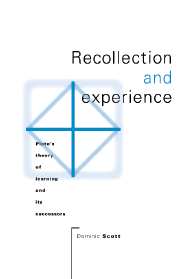Book contents
- Frontmatter
- Contents
- Acknowledgements
- Abbreviations
- GENERAL INTRODUCTION
- SECTION I PLATONIC RECOLLECTION
- SECTION II ARISTOTELIAN EXPERIENCE
- Introduction
- 3 The rejection of innatism
- 4 Levels of learning
- 5 Discovery and continuity in science
- 6 Discovery and continuity in ethics
- Appendix to Section II – Perception of the Universal
- SECTION III HELLENISTIC CONCEPTS
- SECTION IV INNATISM IN THE SEVENTEENTH CENTURY
- CONCLUSION
- Bibliography
- Index of ancient passages
- General index
Appendix to Section II – Perception of the Universal
Published online by Cambridge University Press: 03 December 2009
- Frontmatter
- Contents
- Acknowledgements
- Abbreviations
- GENERAL INTRODUCTION
- SECTION I PLATONIC RECOLLECTION
- SECTION II ARISTOTELIAN EXPERIENCE
- Introduction
- 3 The rejection of innatism
- 4 Levels of learning
- 5 Discovery and continuity in science
- 6 Discovery and continuity in ethics
- Appendix to Section II – Perception of the Universal
- SECTION III HELLENISTIC CONCEPTS
- SECTION IV INNATISM IN THE SEVENTEENTH CENTURY
- CONCLUSION
- Bibliography
- Index of ancient passages
- General index
Summary
In a Delphic parenthesis at An. Po. II 19 100a16-b1, Aristotle says that perception is of the universal:
for although you perceive particulars, perception is of universals – e.g. of man, not of Callias the man.
The same point seems to be made ax An. Po. I 31, 87b28–30:
Even if perception is of what is such-and-such, and not of individuals, nevertheless what you perceive must be a this so-and-so at a place and at a time.
My interest in these lines should be obvious. In my account of Physics I 1 and An. Po. II 8 in chapter 5, I have argued that, for Aristotle, perception involves some hazy grasp of the universal and to perceive something involves seeing it as a belonging to a certain kind. Now the idea that perception grasps the essence dimly has been proposed as an interpretation of the above lines, and so perhaps I ought to be leaping at them in support of my overall argument; in fact, things are not quite so straightforward.
If the point of these lines is that even the earliest perception instils in us a dim understanding of the universal, the negative part of the parenthesis becomes very difficult to understand. If ‘perception is of the universal’ means that perception is aware of the universal, then presumably ‘perception is not of the particular’ means that in perception we are not aware of particulars. But that is very strange.
- Type
- Chapter
- Information
- Recollection and ExperiencePlato's Theory of Learning and its Successors, pp. 152 - 156Publisher: Cambridge University PressPrint publication year: 1995



